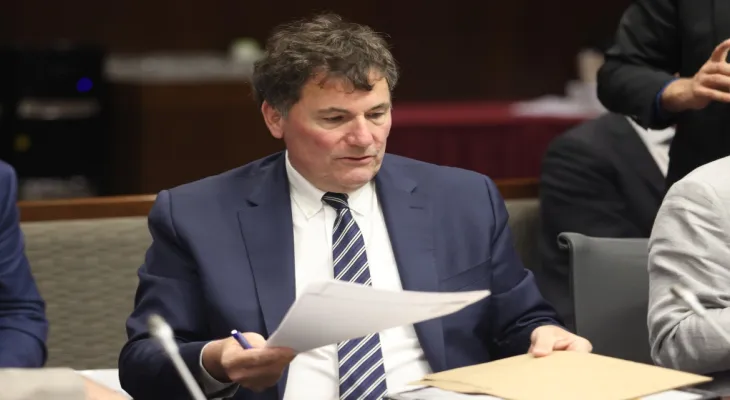Search here
Newspaper
Search here

Arab Canada News
News

Published: June 13, 2024
The Minister of Democratic Institutions, Dominic LeBlanc, emphasized a plan to form a continuous investigation committee into the allegations of collusion between MPs and foreign agents.
However, LeBlanc stopped on Wednesday from accepting a request from a senator to grant Commissioner Marie-Josée Houle the authority to publicly name the MPs involved in the intervention.
The National Security and Intelligence Committee reported to parliamentarians last week that some MPs deliberately assisted foreign efforts to intervene in Canadian politics.
During his questioning before a committee led by Senator Claude Carignan, LeBlanc stated that the government would grant Houle the "appropriate mandate" to examine the issue of potential intervention by MPs.
But LeBlanc said in French that the idea of the committee publicly revealing names was a "legal matter," adding that he did not want to "give an opinion to an important judge" like Houle, who serves in the Quebec Court of Appeal.
Carignan stated that Houle should be granted "the authority to name individuals in the event of violations or crimes," along with the authority to refer matters for potential criminal investigations.
LeBlanc responded, "It's not a question that can be answered with a yes or no."
The minister noted that Houle would be provided with the necessary documents to explore the issues, but not the clear directive to reach conclusions regarding the responsibility of individual MPs.
The House of Commons voted on Tuesday in favor of a proposal from the Bloc Québécois to make the federal investigation examine unproven allegations.
A report from the Intelligence Oversight Committee indicated that foreign countries are engaged in sophisticated and widespread interventions, specifically targeting democratic operations and institutions in Canada before, during, and after elections across all levels of government, with China and India being "the most active culprits."
However, the findings of the oversight body regarding the potential disloyalty of some politicians raised significant concerns.
Elizabeth May of the Green Party, who holds a highly classified security clearance, stated on Tuesday that she felt "great relief" after reading an unredacted version of the Intelligence Oversight report.
May, the co-leader of the Green Party, expressed her belief that the small number of MPs mentioned in the report did not knowingly betray Canada.
She added that a former MP, whose name was not disclosed, accused in the report of proactively sharing confidential information with a foreign agent, should be investigated by the authorities.
Additionally, NDP Leader Jagmeet Singh and Bloc Leader Yves-François Blanchet expressed their desire to see the full report from the Intelligence Oversight Committee.
Singh was scheduled to view the unredacted report late Wednesday and speak to the media on Thursday about what he learned.
Singh stated that if the report showed that any new Democratic MP knowingly participated in the intervention, he would remove them from the party caucus, suggesting that other party leaders should take the same approach.
In response to a question about whether he would use his parliamentary privilege to disclose the detailed findings of the report in the House of Commons, Singh said on Wednesday that he "would not do anything that jeopardizes national security."
The Conservative leader, Pierre Poilievre, has not taken the necessary steps to obtain the security clearance required to read the report in full.
While they gathered at their weekly party meeting on Wednesday, Conservative MPs did not pause to answer questions about whether Poilievre should read the unredacted report.
Liberal MP David McGuinty, who heads the parliamentary committee on espionage oversight, stated that national security and intelligence should not be a partisan issue.
"I think leaders can come together and have an adult conversation about how to tackle this issue in our parties?"
McGuinty noted that the report highlighted that political nominations and leadership contests are susceptible to foreign interference. "So why don't we bring our leaders together to address this issue?"
He also urged people to take a broader look at the problem of foreign interference.
He said, "The stakes are high." "Our democracy is at stake."
Comments